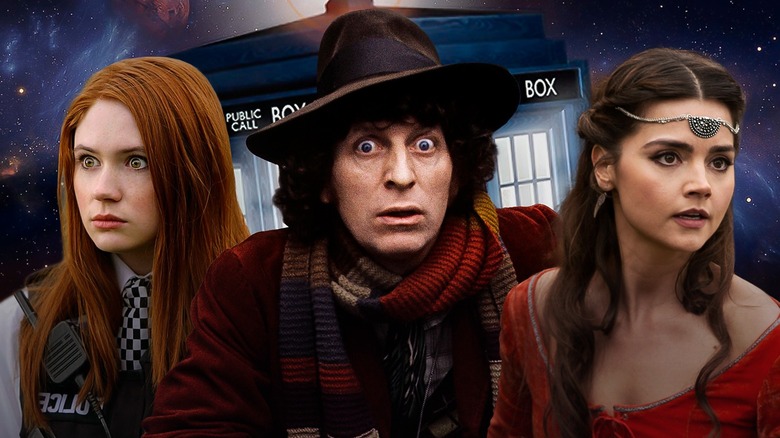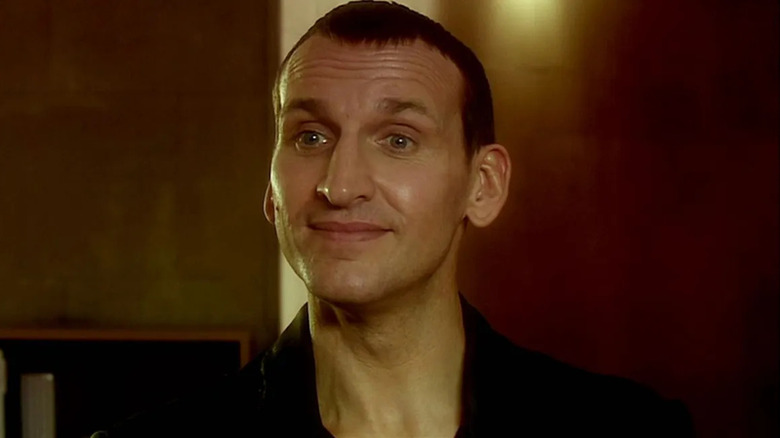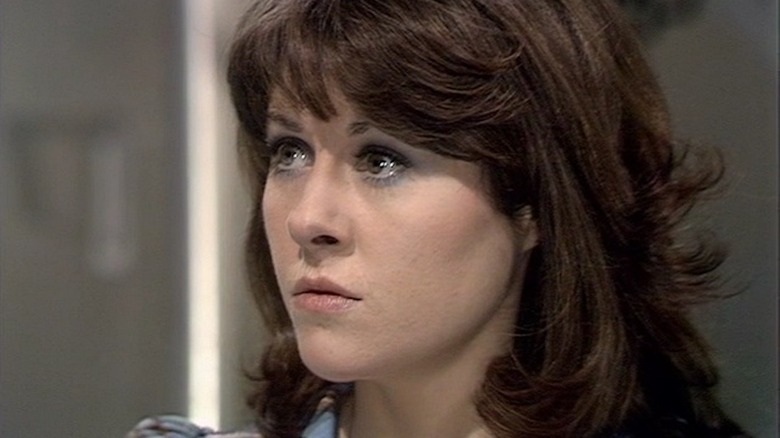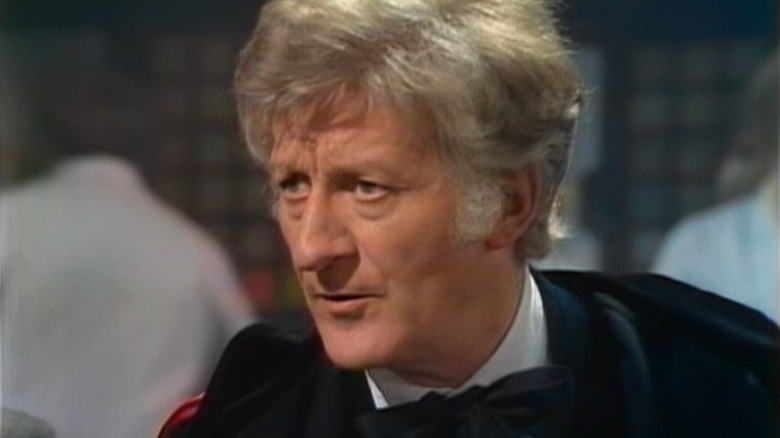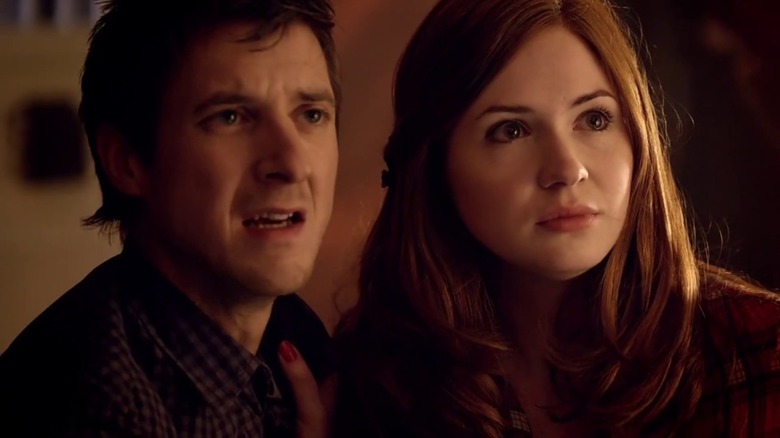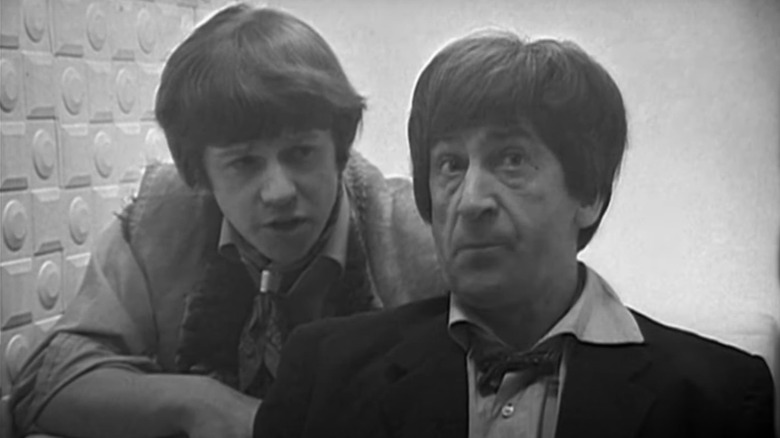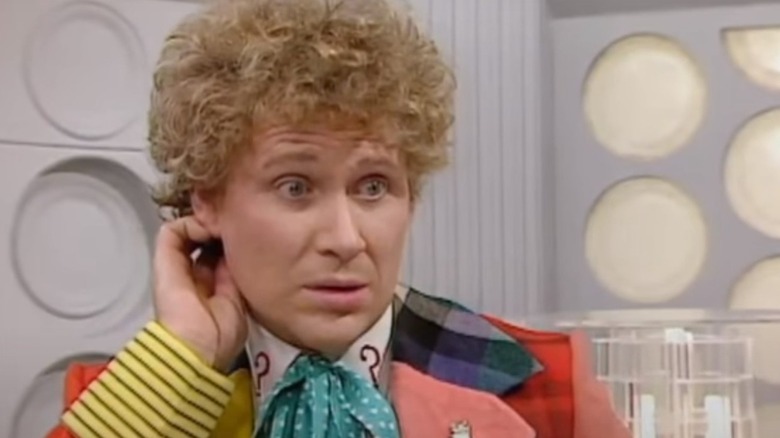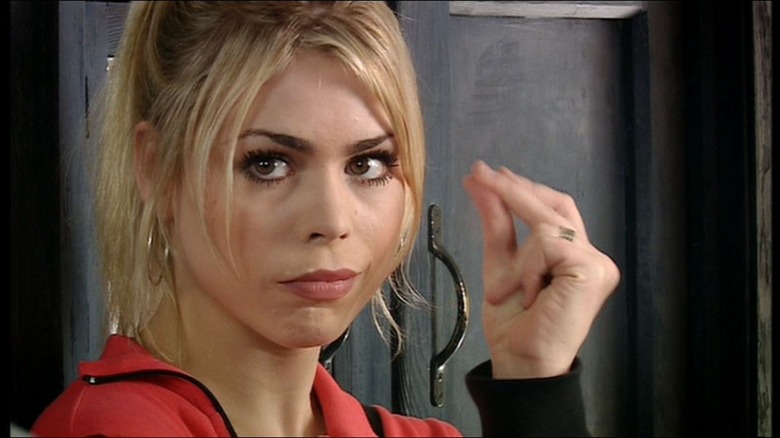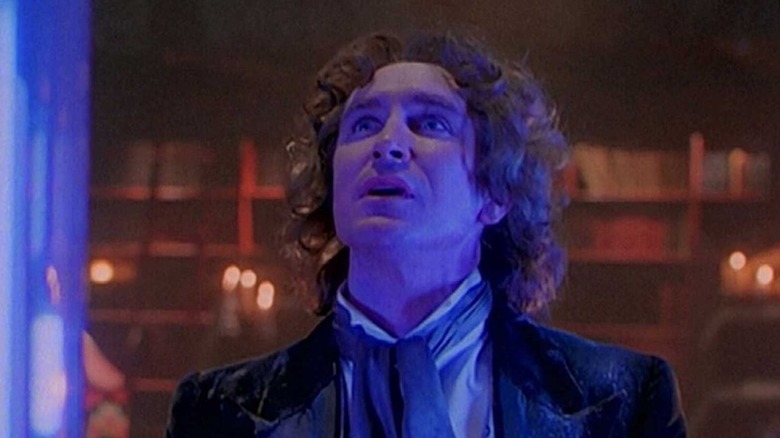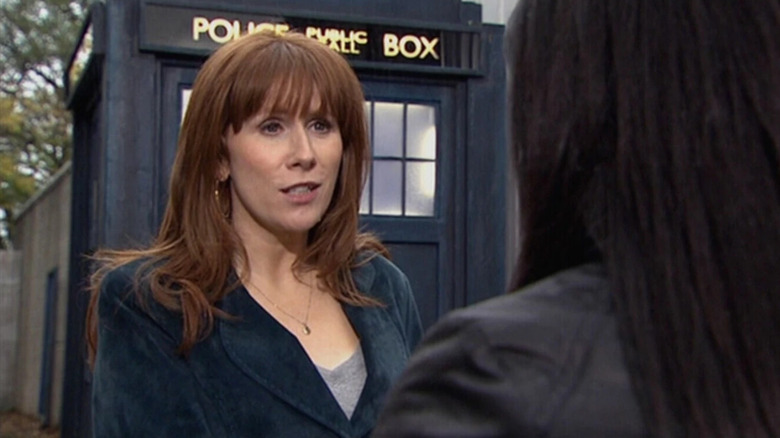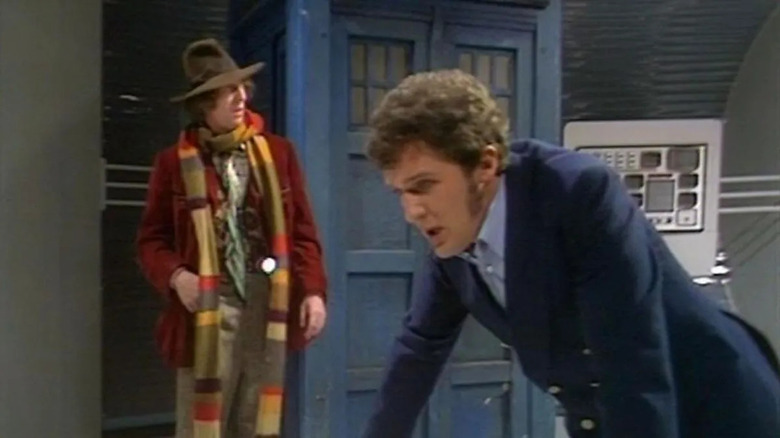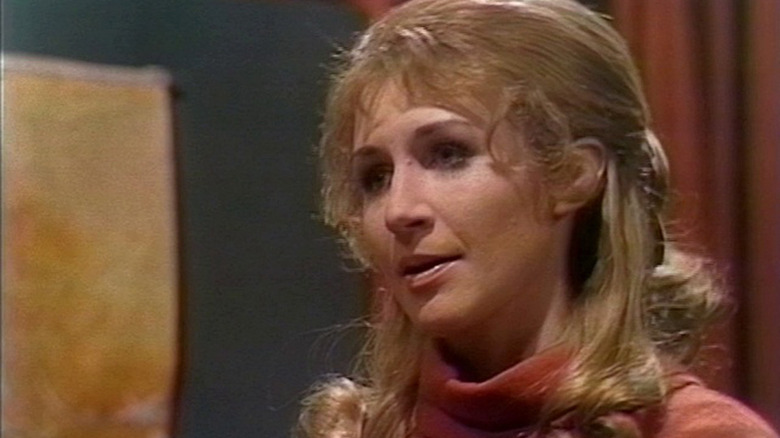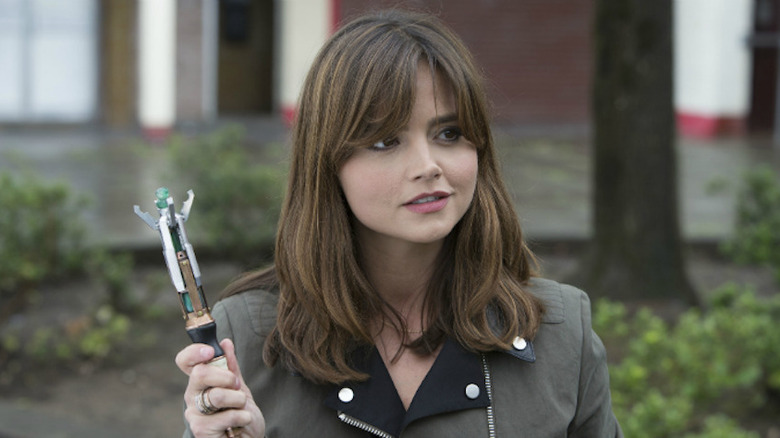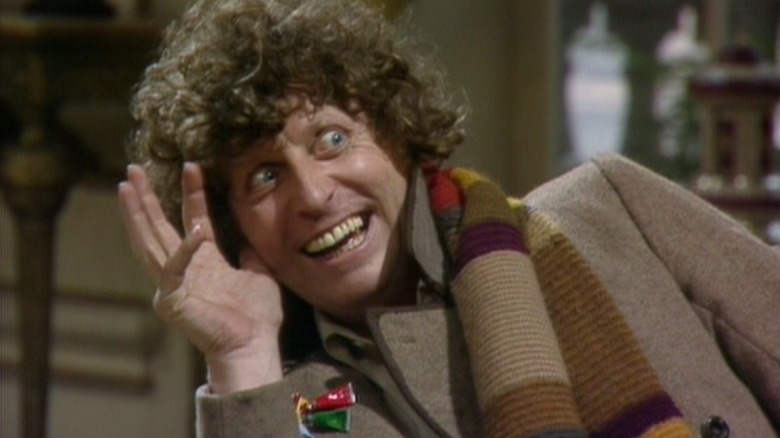The Real Reason These Actors Left Doctor Who
When it debuted in 1963, "Doctor Who" was seen as an educational adventure show for kids, but quickly grew to become a cultural landmark in the U.K. Uniquely British, it captivated millions in its native England before global audiences ever got a taste of the phenomenon. Unlike so many of its short-lived sci-fi contemporaries like "Star Trek" or "Lost in Space," the little time-hopping family series called "Doctor Who" endured, ultimately running an astonishing 26 seasons before it came to a close in 1989.
In 2005, the show returned and has been running ever since, with a new cast once every few years. While The Doctor's faithful companions have come and gone, The Doctor has merely regenerated, allowing the character to be played by no less than 14 actors in total — and that's not counting actors like John Hurt and Jo Martin who played The Doctor, but not in the capacity of an official series lead. But the reasons stars leave the series can vary wildly. For some, it might be a simple matter of aging out of the role or growing weary of the weekly grind of filming. For others, it might be because of a behind-the-scenes controversy or an unhappy producer who forced them out.
But in the history of "Doctor Who" some of the biggest stars have walked away to the shock of many fans. Now, we're digging into cast interviews to discover why they really left the show.
Christopher Eccleston
He was chosen to usher in a new era for "Doctor Who" in 2005, but Christopher Eccleston left the series after just one year. His departure was full of controversy, too, with the BBC initially releasing a statement that the actor left because he was burnt out that even included a supposed quote from Eccleston. But the studio quickly retracted the statement, admitting they made all that up and even faked the quote.
Though Eccleston remained tight-lipped, there had long been talk of conflict with producers, which was only bolstered by the messy parting of the ways. He eventually started describing the problems he had on the set that made him want out, but more than 10 years passed before he started getting into specifics.
"My relationship with my three immediate superiors –- the showrunner, the producer and co-producer –- broke down irreparably during the first block of filming and it never recovered," he told The Radio Times in 2018. They lost trust in me, and I lost faith and trust and belief in them." He promised to never work for producer Russell T. Davies again, but he's returned to the role for a series of audio dramas from longtime BBC partner Big Finish Productions that Davies isn't involved in.
Elisabeth Sladen
Arguably, the most beloved of The Doctor's many companions over the years might still be Sarah Jane Smith, played by actor Elisabeth Sladen. She joined the show in 1973 as a sidekick to Jon Pertwee's Third Doctor and continued after the arrival of Tom Baker's Fourth Doctor. She remained partway through the show's 14th season, departing at the conclusion of "The Hand of Fear" in 1976. It was that year that Sladen decided it was time to leave, feeling she should go out before fans grew tired of her.
In her autobiography, Sladen talked about how concerned she was that she'd be pushed out of the show following a change in producers. "When I go, it's going to be my decision," she recalled thinking. "It's going to be when Sarah Jane Smith is still popular — I'm not going to be pushed." Nevertheless, Sladen stuck with the show a little longer, but she knew when to move on. "You know when the time is right. You can't stick around just for the money."
But Sladen also hoped that Sarah Jane wouldn't be killed or married off. Her exit was written in such a way that she was able to return for the 2006 episode "School Reunion" before getting her own spin-off, "The Sarah Jane Adventures."
Jon Pertwee
The Third Doctor, Jon Pertwee helped bring the show into a new decade and into the vibrant world of color television. When he left, the series was more popular than ever, with some of its highest ratings. Unlike some others, Pertwee didn't leave the show simply because he wanted to go out on top.
The truth is, the closing of Pertwee's era saw great upheaval for the show. Kay Manning — who played companion Jo Grant — left in 1973, while recurring actor Roger Delgado (The Master) was killed in a car crash, which shook the cast and crew. Several important higher-ups were also on the way out, and all these changes prompted Pertwee to end his run.
"Roger had been killed and I was really upset about that," Pertwee said in a 1995 interview. "I really wouldn't want to work with any other Master." With other behind-the-scenes figures also leaving the show, Pertwee said, "it seemed to be the end of an era." But Pertwee also had concerns about typecasting. "I did realize that I had stamped myself with this 'Doctor Who' image." At the same time, Pertwee offered BBC executive Shaun Sutton another year if he was given a pay bump. Sutton responded with an emphatic "'Bye!'"
Karen Gillan and Arthur Darvill
In 2010, "Doctor Who" got an overhaul, bringing in Matt Smith as The Eleventh Doctor and Karen Gillan as his new companion Amy Pond. Arthur Darvill played Amy's boyfriend Rory, and he'd join the cast as a series regular a year later. Midway through their third year on the show, though, Gillan and Darvill shocked fans when they left the show, with The Doctor losing Amy and Rory in the episode "The Angels Take Manhattan."
At the time, both actors' careers were on the upswing, and Gillan told IGN in 2012 that she knew she had to leave the show. "I wanted to make sure that I went on a high when the character was at her prime. ... It just felt right. I like to go on instinct." But it wasn't just Gillan, because Darvill was also ready to go. In 2023, he talked about how their ending came about in an interview with Rob Brydon.
"We all had a meeting, they said 'how long do you want to do [this]... this is what we think,'" he recalled. "And myself and Karen kind of felt the same, and they wrote us a good ending and we left." A year later, Gillan joined the MCU as Nebula, while Darvill was cast alongside David Tennant in the critically acclaimed crime drama "Broadchurch."
Frazer Hines
Longtime companion of The Second Doctor, Jamie McCrimmon was played by actor Frazer Hines, and he was never intended to be a full-time companion. Nevertheless, he joined The Second Doctor's first season midway through and stayed with it through Patrick Troughton's final episode in 1969. Ironically, though, it was actually Troughton who convinced him to stay on longer than he originally intended.
"My agent was advising me to leave," Hines told Sci-Fi Now in 2018. "I was going to leave earlier ... I remember the 'Daily Sketch,' front page news — 'JAMIE IS TO LEAVE 'DOCTOR WHO.' Patrick read it and said, 'I'm leaving in six-months' time, my contract ends, my wife's been saying I should be doing other stuff, wait for me.' So I stayed on ... and left with Patrick." But just because Hines left of his own accord doesn't mean he did so with any amount of enthusiasm, and the actor still sounds like he has some regrets about listening to his agent.
"I still say that if my agent hadn't been nagging me ... [I'd] still be there now."
Colin Baker
The era of Colin Baker, who joined the show in 1984, is sadly marked by the beginning of the end for classic "Doctor Who." A confluence of factors led to its decline, including a string of bad stories, lower production values, and the general perception of the show as goofy and childish. Still, nobody can fault Baker, who brought a touch of cynical charm to the role that it hadn't had in years. But Baker's era also produced shorter seasons, with less than half as many episodes as in previous years.
Regrettably, Baker didn't leave "Doctor Who" by his own choice. Mostly due to the troubles the show was facing, producer John Nathan-Turner was under pressure to improve the show and chose to make Baker his first major move, essentially firing the actor by phone call. This was particularly troubling for the actor, who was expecting a baby, but he kept a solid perspective, seeing it instead as paternity leave. But that doesn't mean Baker was happy: On the contrary, when asked to return for the next season's premiere to film his own death and regeneration into Sylvester McCoy, the actor outright refused.
Years later, Baker would express regret for taking his bitterness out on the fans, effectively denying them a goodbye. "I was being brutally selfish at the time and I just felt annoyed," he told Radio Times. "Because I loved that part ... and I thought I had more to offer."
Billie Piper
When "Doctor Who" returned in 2005, new star Christopher Eccleston was accompanied by a very different kind of companion. Her name was Rose Tyler, and she was played by actor and singer Billie Piper. Every bit a woman of the 2000s, Rose was hip, vibrant, and independent, but with a sensitivity that made her the perfect match for the darker Ninth Doctor.
But Piper stayed with "Doctor Who" through his regeneration, and arguably had her best days beside Eleventh Doctor David Tennant. After a while, though, the role wore her out, and the actor chose to walk away. "If I'm honest, I found 'Doctor Who' quite overwhelming at times," she said in a 2017 interview in an issue of "Doctor Who Magazine" (via Futurism). Eventually, Piper realized that starring in one of the hottest shows on TV also had its downsides. "It becomes a topic of every conversation. Leaving was sad, but I wanted a change. I really needed a separation from it."
She got that separation, but she wasn't done with the role forever. She returned for a cameo in the 2013 special "The Day of The Doctor."
Paul McGann
By 1996, "Doctor Who" had been off the air for seven years, but there was interest in bringing the franchise to a new American audience. A co-production with 20th Century Fox — at one point intended to be directed by Steven Spielberg — did just that, but despite its American backing, British star Paul McGann was picked for the main role. The movie reintroduced The Doctor for a new generation and overhauled the series. Though it's not especially well-known or highly regarded, even among devoted "Doctor Who" fans, the 1996 movie had an enormous impact on the franchise.
From the steampunk look of the TARDIS to the possibility of The Doctor being romantically linked to his companion — not to mention its more fast-paced opening credits sequence — the later 2005 reboot of "Doctor Who" took a lot of inspiration from the 1996 telefilm. Unfortunately, while ratings were solid in the U.K., it was a flop stateside. As a result, Fox — which bankrolled the project with the hopes of spinning it off into a new weekly series — balked at supporting a follow-up.
About a decade later, when BBC renewed the franchise on the small screen, McGann wasn't asked back, making McGann's time as The Doctor one of the shortest yet. But fans never forget a Doctor and McGann made a surprise return for "The Night of The Doctor" in 2013.
Catherine Tate
Out of all the actors who've played companions, Catherine Tate may have one of the most interesting careers. A well-known comedian and TV star already, she first joined for the one-off adventure "The Runaway Bride," a 2006 special, and was never meant to be a full-time companion. But after Freema Agyeman left at the end of the following season, the show found itself in need of another assistant. Thanks to the strong response to Tate's earlier appearance, the show brought her back.
Tate returned for a full season in 2008 and was part of some of The Tenth Doctor's biggest stories, including his first meeting with River Song and "The Doctor's Daughter" where David Tennant met his real-life wife, Georgia Tennant (née Moffett). The fact is, though, even after joining the series full time, Tate's tenure was pre-determined when she signed up. With David Tennant already knowing he'd be leaving soon along with showrunner Russell T. Davies, Tate's contract was only for a single year of stories.
Once again, though, Tate returned unexpectedly, this time rejoining David Tennant for a series of new specials in 2023. This makes her the rare actor to return as a multi-episode companion after having left the series.
Ian Marter
When a doctor regenerates and a new actor arrives in the role, it often means there's a new companion on the horizon, too. So, flash back to 1974, and the series was in need of a new lead after Jon Pertwee left. In came Tom Baker, with his long scarf and broad smile, and with him was new assistant — Harry Sullivan, played by actor Ian Marter, who'd appeared as a different character a year earlier and obviously impressed producers.
The duo proved delightful, but Harry wasn't long for the series, leaving after just two serials into his second year. And the reason might be somewhat surprising, with its roots in the exit of Jon Pertwee when they were still searching for a replacement. "They cast me (as Harry) before they knew anything about the new Doctor," Marter told Doctor Who Magazine in 1984. "I was brought in in case The Doctor had been made much older and couldn't handle the physical side of the series. ... As it was, Tom didn't really need me there at all."
Though producers tried turning him into something of a comic relief character, they eventually felt that it wasn't working. "I hadn't decided to go. Harry, the character (and that meant me too), was dropped from the series because he had finally outlived his usefulness and was simply getting in the way."
Caroline John
In 1970, Caroline John began her run on "Doctor Who" at a time when the series was undergoing a reformatting. Jon Pertwee was beginning his own stint as The Third Doctor, trapped on Earth and having more action-oriented adventures that entail defending the planet from alien invaders. Rather than a naive, innocent companion thrust into a grander world, Liz Shaw is an accomplished scientist, marking a break from the standard for female characters in science fiction during the era.
Though her time on "Doctor Who" was a big success, John left after that single season, returning only for an appearance in the 20th anniversary special, "The Five Doctors." As for why, well, it's rather disheartening to learn, but producer Barry Letts wasn't thrilled with having such a smart, capable young woman as a companion to The Third Doctor. The feeling at the time was that Liz Shaw made The Doctor look less impressive, and however we might feel about that today, John wasn't wholly unhappy to lose the gig.
In fact, the timing may have been fortuitous, because just before her firing, John became pregnant, and with her husband Geoffrey Beevers (who later played The Master in 1981), they welcomed Daisy Ashford into the world not long after. As fate would have it, Ashford went on to play her mom's old character in the Big Finish audio dramas decades later.
Jenna Coleman
With Amy and Rory out in the middle of Season 7, The Eleventh Doctor needed a new companion. Jenna Coleman appeared first in the 2012 episode "Asylum of the Daleks," in a rare case of producers teasing her future arrival, which came properly several episodes later. Eventually, as companion Clara Oswald, she became the center of a seasons-long story that ties back to the origins of The Doctor himself. And when Matt Smith left the series, Coleman transferred her services to The Twelfth Doctor, Peter Capaldi, eventually becoming the longest-serving companion on the relaunched series.
To the surprise of many, Coleman left after Season 9's "Hell Bent" when Capaldi still had another year to go on the show. Believe it or not, though, she almost left earlier. "My contract was up at the end of [Season 8]," she told Entertainment Weekly. "That initiated conversations of, 'Okay, when and how [do you want to leave]?' ... There were just ongoing discussions about how to end Clara's story, as it were, in the TARDIS, and this is where it ended up."
As for why she didn't simply renew her contract, well, she reportedly walked away because she'd snagged the leading role in the critically acclaimed drama "Victoria."
Tom Baker
In the history of "Doctor Who," Tom Baker — who played the eccentric Fourth Doctor — remains one of its most beloved stars. And it's probably no coincidence that he still holds the record for the longest time in the role, serving as The Doctor for a whopping seven seasons and 172 episodes. But Baker's time as The Doctor wasn't all mugging for the camera, as the star became more involved with the making of the show as his star power grew.
Though he threatened to quit on occasion, Baker stuck with the show year after year. But in 1980, new producer John Nathan-Turner arrived and there were instant problems. "I didn't like his approach to anything very much," Baker told Digital Spy in 2018. "His approach as a producer, to the scripts, and to my performance ... he managed somehow — how terrible — to diminish me. He made assumptions about how I should do things, or what lines meant, or how it should be shot, which diminished me, and I found that unbearable." So Baker eventually called it quits.
Infamously Baker refused to film any new scenes for "The Five Doctors" anniversary special, not wanting to share the screen with four others. But he finally returned to the series decades later for a jaw-dropping cameo in the 2013 special, "The Day of The Doctor."
